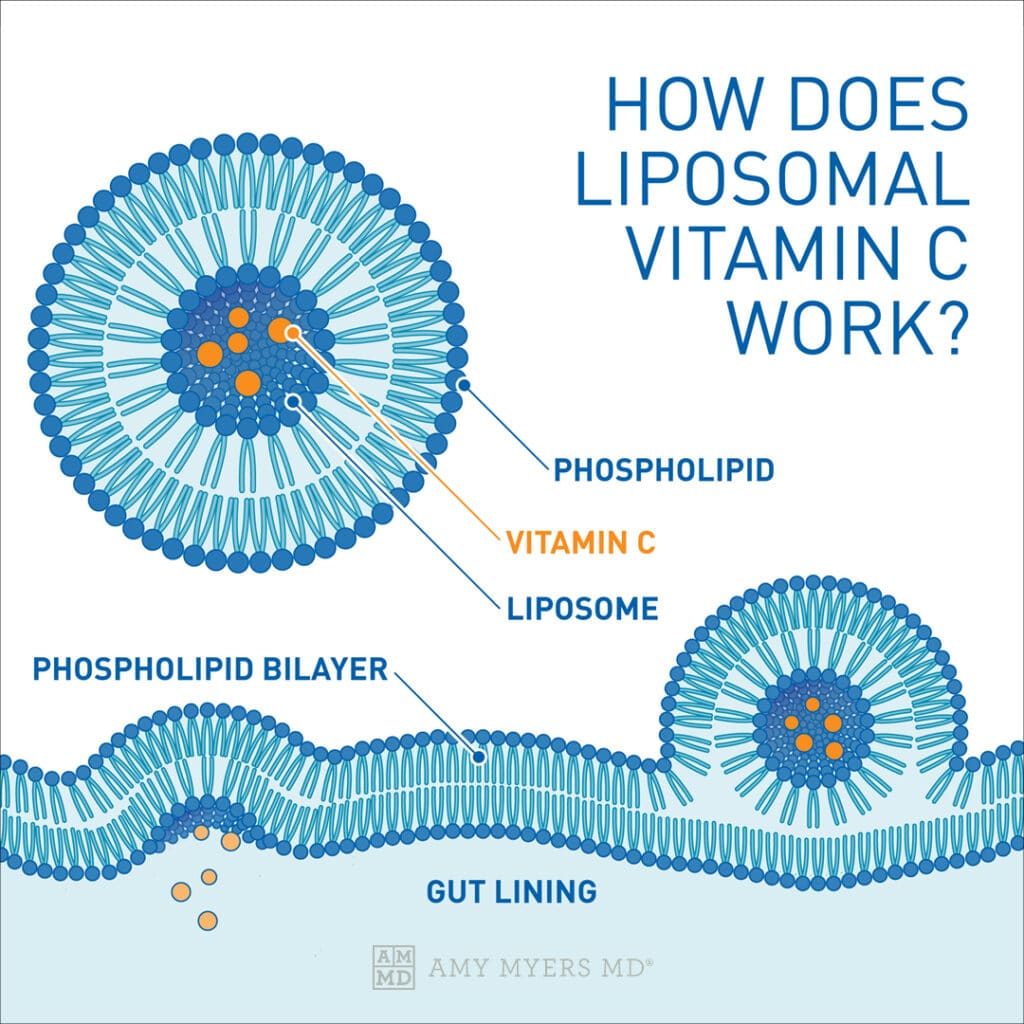If you’ve been following me for a while, you know I’m a huge advocate for “It’s not what you eat, it’s what you digest and absorb.” That includes essential nutrients such as vitamin C.
Ascorbic acid, more commonly known as vitamin C, is known to offer numerous health benefits. Not only can it be found in foods like citrus fruits, berries, and cruciferous vegetables, but it’s a popular supplement around the world. Regular intake of vitamin C supplements supports your immune system, promotes heart health, and boosts collagen production.
While there’s good reason for its glowing reputation, there are downsides. Vitamin C is hard to preserve, which makes it unstable. And because of how quickly your digestive system moves food through, taking oral vitamin C by mouth tends to be poorly absorbed. The result is that you don’t always get the full benefits.
The fix? My Liposomal Vitamin C supplement! Let me explain.
A Better, Stronger Liquid Vitamin C
Many people believe that when you take vitamin C, your body automatically absorbs the full dosage. This is especially true of liquid vitamin C. Another common misconception is that the more you take, the more benefits you’ll get.
The truth is that you only absorb between 12-14% of vitamin C in an oral supplement form. That number gets bumped up to 50% absorption for doses over 200mg.1 The good news is that vitamin C is water-soluble, meaning it’s nearly impossible to overdose. Whatever your body doesn’t absorb is secreted through your urine.
That’s a tough pill to swallow, especially when you want to reap all the amazing benefits of this critical vitamin. With the constant attacks on our health, we need all the immune system support and antioxidant benefits of vitamin C we can get!
So if bioavailability makes all the difference, what makes Liposomal Vitamin C the better option?
Liposomal Vitamin C
What exactly is Liposomal Vitamin C? Essentially, Liposomal Vitamin C is a more potent form of liquid vitamin C. It’s specifically designed for maximum absorption and optimal immune support.
What makes this formulation unique is that this vitamin C comes in liquid form which is then encapsulated into nanosized micelles. These micelles are further enveloped in liposomes. The liposomes shield the tiny vitamin C micelles from the hostile environment and absorption barriers found in the human gut.
To better understand how the structure of Liposomal Vitamin C increases vitamin C absorption, let’s dive deeper into what a liposome is.
The Definition of Liposome
Liposomes and vitamin C make a great team. A liposome is a tiny fluid-filled bubble, otherwise called a vesicle, made from the same material as a cell membrane2. Various fluids — such as drugs used to treat a host of diseases — are transported throughout the body via liposomal “carriers.”
Imagine your body is a highway and vitamin C the traveler. The liposome makes the difference between traveling safely by car versus walking barefoot on a busy motorway. When vitamin C travels inside a liposome, it has a better chance of arriving safely at its destination.
The presence of liposomes is the main difference between Liposomal Vitamin C and conventional oral capsule, or liquid vitamin C.
What Does Liposomal Mean?
Now that we know what a liposome is, we can dive into the process of how Liposomal Vitamin C uses liposomes as an administering agent.
Nutrients such as vitamin C need to be digested slowly in order to achieve maximum absorption. But before they reach your small intestine, they have to survive your stomach acid and enzymes. By the time it gets to your intestines, your body has broken it down quite a bit. This leaves only a portion of the vitamin C that’s actually processed.
To make sure your body is receiving as much vitamin C as possible, we employ liposomes to create a protective layer of phospholipids. This helps the vitamin C bypass your digestive process more efficiently. In short, “liposomal” is the process of employing liposomes to protect certain vitamins and minerals as they make their way through your body.
 Dr. Amy Myers
September 28th, 2023
https://content.amymyersmd.com/article/what-is-liposomal-vitamin-c/How Liposomal Vitamin C Works in Your Body – Infographic illustrating the configuration of liposomes, phospholipids, and vitamin c – Amy Myers MD®
Dr. Amy Myers
September 28th, 2023
https://content.amymyersmd.com/article/what-is-liposomal-vitamin-c/How Liposomal Vitamin C Works in Your Body – Infographic illustrating the configuration of liposomes, phospholipids, and vitamin c – Amy Myers MD®The Definition of Phospholipid
Liposomes contain phospholipids. If you remember from chemistry class, phospholipids are phosphorus-containing, fat-like substances that make up a cell membrane. The phospholipid cell membrane is essential for protecting cells from the outer environment. It also helps your body get the most out of Liposomal Vitamin C.
If you were to look at Liposomal Vitamin C under a microscope, you might think it looks similar to an onion. That’s because it has numerous layers surrounding its core. The phospholipid bilayers provide barriers to protect the cell. It also provides pathways for various substances across membranes.
Each phospholipid bilayer is semi-permeable to allow water, oxygen, and carbon dioxide to pass through. This layer also restricts harmful substances such as stomach acid, enzymes, and free radicals. You can thank your phospholipid bilayers for helping you receive optimal vitamin C absorption.
Benefits of Liposomal Vitamin C
Now you understand how liposomes use phospholipids to protect vitamin C as it travels through your body. Let’s talk about what happens when Liposomal Vitamin C reaches your gut.
Liposomal Vitamin C Improves Absorption
As I mentioned earlier, vitamin C is water-soluble. This means it can’t penetrate fatty tissues very well. In order to become more bioavailable, it needs phospholipids. One example of these are found in liposomes.
However, as the liposomes travel through the digestive system, the phospholipid bilayers slowly begin to peel away. As this happens, the micelles are gradually released. Eventually, the buffered vitamin C is deposited near the gut lining. This enables it to be fully absorbed, maximizing the benefits your body experiences from Liposomal Vitamin C.
How Liposomal Vitamin C Works in Your Body
Because Liposomal Vitamin C has that protective layer of phospholipids, it can move to your small intestine more quickly. Doing this allows it to attach to your gut lining cells, directly transferring vitamin C.
From here, it makes its way through your lymphatic system, then through to your bloodstream. Then, it gets absorbed and used by your cells. Your cells absorb up to 98% of the available vitamin C.
So you see, Liposomal Vitamin C is incredibly beneficial for those of us who want to optimize absorption. It’s time you reaped all the benefits of this health-enhancing nutrient!
Benefits of Vitamin C
Vitamin C plays a vital role in maintaining optimal health. In fact, it is critical for the development, growth, and repair of all your body’s tissues. Here is why vitamin C is so beneficial to your health, especially if you’re dealing with autoimmune issues.
Antioxidant Benefits
Vitamin C supports your body in eliminating damaging free radicals from your body. Free radicals can be toxic chemicals and pollutants that can lead to serious health conditions. They also contribute to premature aging. 3
Collagen Boost
Collagen is the glue that holds your body together. This protein plays a vital role in maintaining a healthy gut. It also helps keep your hair, skin, nails, bones, and joints strong. Your body requires ample amounts of vitamin C for optimal collagen production.
Eye Health Benefits
Vitamin C supports your body in fending off macular degeneration, a key factor in vision loss.
In addition to this, Liposomal Vitamin C helps your body absorb iron, supports wound healing, and augments the maintenance of cartilage, bones, and teeth.
When our stress levels are at an all-time high, our bodies can quickly get run down. It’s critical to be able to effectively absorb the vitamins and minerals we ingest. That’s why I created my signature Liposomal Vitamin C supplement. This powerful supplement helps you maximize the absorption of vitamin C to better support your immune system.
Liposomal Vitamin C for Better Absorption
Maximizing your uptake of vitamin C facilitates a healthy immune response. Its high antioxidant profile supports all aspects of heart health, as well as prevents oxidative damage to your cells. And if that wasn’t enough, it has the power to boost your collagen production. That means better skin, hair, nails, and gut health!
When you take our high-quality, liquid vitamin C formula, you don’t have to worry about taking multiple capsules to reach an optimal dose.
As a mother myself, I know how hard it is to get kids to take vitamins. My Liposomal Vitamin C supplement has a citrus-packed flavor you and your family will love. Just take one tablespoon per day to reap all the rewards of vitamin C!

Liposomal Vitamin C FAQs
Who can benefit from taking Liposomal Vitamin C?
Who can benefit from taking Liposomal Vitamin C?
As Vitamin C supplementation (especially with liposomal delivery) has been shown to support natural levels in the blood, virtually anyone living in the modern world today could likely do with a helping hand.
What does vitamin C do for your skin?
What does vitamin C do for your skin?
Vitamin C is a precursor to your body’s natural collagen production. Collagen is the most abundant structural protein in your body and is quite literally the “glue” that holds your body together. Without vitamin C, your body cannot naturally synthesize the collagen it requires to promote healthy skin.
What time of day should I take Liposomal Vitamin C?
What time of day should I take Liposomal Vitamin C?
Liposomal Vitamin C can be taken any time of day on an empty stomach or between meals.
Article Sources
- Vitamin C function and status in chronic disease. Gity Sotoudeh. National Library of Medicine. 2002.
- Liposome: classification, preparation, and applications. Akbarzadeh A, Rezaei-Sadabady R, Davaran S, Joo SW, Zarghami N, Hanifehpour Y, Samiei M, Kouhi M, Nejati-Koshki K.. National Library of Medicine. 2013.
- Dietary Reference Intakes for Vitamin C, Vitamin E, Selenium, and Carotenoids. Institute of Medicine (US) Panel on Dietary Antioxidants and Related Compounds.. National Academics Press. 2000.
